As I drank my morning coffee and scrolled through Twitter one morning, I stumbled upon a preview for the Chilling Adventures of Sabrina. At first, I didn’t quite realize where it was from. The name sounded familiar, them it hit me! It was a reboot of Sabrina the Teenage Witch. I was instantly intrigued. I thought, if the executive producers of Riverdale worked on it, it must good right?
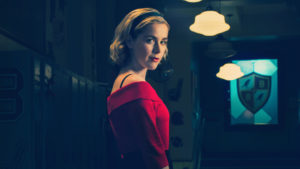
I am one for originals so let me start with Sabrina the Teenage Witch. Of course I had watched the new version first, but for the sake of old times, I revisited the original. And may I say, it was everything I missed. Hilda and Zelda’s relationship was like every sister’s relationship. They would get on each others nerves but in the end they always looked out for each other. Sabrina was also their pride and joy and would do anything for her!
Sabrina, in the sitcom, I found to be very brave and thoughtful. The moment she found out she was a witch, she used her magic for her friends and yes, sometimes her uses could be selfish. However, all of her uses of her magic, no matter what it was used for, came from the heart. Especially when it came to Harvey, who as you may know is her soulmate. Despite him being her boyfriend throughout the series, it never stopped Sabrina from pursuing her dream. Sabrina had also always been passionate about her studies and succeeding. This is part of the reason why I have always loved her as a character.
Salem takes the cake though. He is a comedic gift from the Gods. I mean it when I say Salem is the best character on the show. As most of you probably know, Salem is their family cat and has been with Hilda and Zelda for years. Salem is their familiar, but Salem has a backstory which is undeniably hilarious. Salem was originally a witch, but after attempting world domination, he was sentenced to hundreds of years of being a cat. Despite him being a cat, that doesn’t stop him from causing tons of shenanigans throughout the series. This just gives him more character.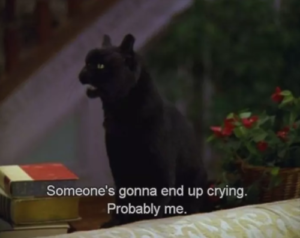
Yes, it may be goofy and yes, it may not be gritty, but it’s lighthearted. Sometimes, you just need a little laugh.
Now that I have clearly state my love for the 90s sitcom, I should state my thoughts on the Chilling Adventures of Sabrina.
Now, in this series being a witch is no surprise for Sabrina unlike in the Sitcom. She has known she was a witch since she was little and in this series, her parents have passed leaving Hilda and Zelda (including her cousin Ambrose, who was not in the sitcom) to take care of her. In the sitcom, Sabrina isn’t allowed contact with her mortal mother or her mother will be turned into a ball of wax. Her father, in the sitcom, was out traveling and working. The way they approached her parents in the Netflix series was just rather bleak.
Salem the cat in the new series, does not talk. He also does not have his awesome backstory not to mention that Sabrina attains Salem by summoning her own familiar. I would have nothing against this way of approaching introducing Salem. In fact, it is more or less that I’m angry that Salem doesn’t talk. He doesn’t bring anything to the table in the new series. Salem, in fact, is hardly shown in the show despite him being very important in the sitcom version.

Now, let’s talk about Harvey. This is something that I hold a lot of thoughts on. In the sitcom Harvey is a doof. He’s goofy and somehow never found out that Sabrina was a witch for years. Netflix must’ve upped Harvey’s IQ because he does not skip a beat in the new series. Not to mention the fact that despite Harvey being Sabrina’s boyfriend, he was always sort of a side character.
In the Netflix series, you are introduced to Harvey’s family. Of course, you’ve had some backstory for Harvey in the sitcom. You knew his parents were together, he had sibling and his dad worked as an exterminator. In the Netflix series, Harvey has a brother and a dad, and his dad works in a mine. His dad, in the Netflix series, is rather aggressive and abusive, which was never established in the sitcom.
My final comparison about Harvey comes to his reaction to when he finds out that Sabrina is a witch. In both series Harvey is clearly did not handle Sabrina being a witch very well. In the sitcom Harvey ends up breaking up with Sabrina for a very short moment. Towards the end of the series, Harvey ends up patching up things with Sabrina. In fact, they end up becoming very good friends like they did in the beginning of the sitcom. In the Netflix series, Harvey wants to end all ties with her. He acted like being a witch was the equivalent of being a monster. In fact, even when Sabrina tries to patch things up and help Harvey, he still treats her like a monster.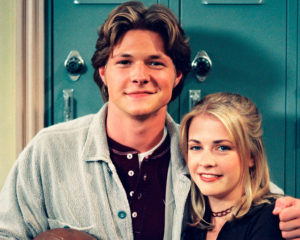
This leaves me to my final thoughts. I would like to end this post talking about how the two series deal with the topic of witches. In the sitcom, they treated witches differently than in the Netflix series. In Sabrina the Teenage Witch, all the witches lived harmoniously. They had their own government, The Witches Council, and lived in what they called the Other Realm. However, some witches chose to live in the mortal realm, which is earth.
In the Chilling Adventures of Sabrina, they use cliche witch backgrounds. They make them seem quite evil when they really are not. Of course I am not saying there aren’t any witch stereotypes in the sitcom. In the sitcom, they have their familiars and also make potions in cauldrons, however, those do not compare to the stereotypes portrayed in the Chilling Adventures of Sabrina. In the Chilling Adventures of Sabrina, they portray witches like every media platform does. This bothered me the most.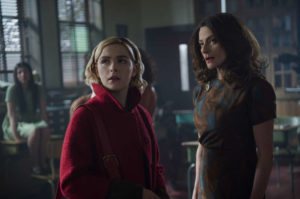
I love the sitcom because it is not full of stereotypes. It doesn’t make witches out to be Satan loving monsters. Not all witches, in my opinion, are Satan loving monsters. I understand they wanted to make a gritty remake, but what made the sitcom so original to me was how lighthearted it was, even if they did touch up on difficult topics.
The way Netflix portrayed witches to me was something that I’ve seen so many times before. Making witches Satan worshippers is so. . .overused and not at all true. Today, there are people who identify as witches who do not worship Satan. I find the use to having a “dark baptism” and celebrating their “lord Satan” in the Netflix series is stereotyping and frankly, rude.
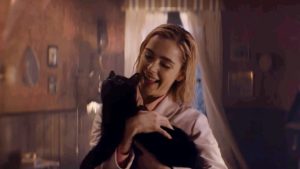
Lou is a writer of rom coms, eater of pizza, lover of 90s boybands and cat enthusiast. You can follow her on Twitter at @aweosmewriter.
Enjoy this writing advice and want more content like it? Check out the classes Cat gives via the Rambo Academy for Wayward Writers, which offers both on-demand and live online writing classes for fantasy and science fiction writers from Cat and other authors, including Ann Leckie, Seanan McGuire, Fran Wilde and other talents! All classes include three free slots.
If you’re an author or other fantasy and science fiction creative, and want to do a guest blog post, please check out the guest blog post guidelines.






 About the author: Michael Mammay is a science fiction writer. He is a retired army officer and a graduate of the United States Military Academy. He has a master’s degree in military history, and he currently teaches American literature. He is a veteran of Desert Storm, Somalia, and the wars in Iraq and Afghanistan. His debut novel, Planetside came out in July, 2018, and was selected as a Library Journal best book of 2018. The audio book, narrated by RC Bray, was nominated for an Audie award. The sequel, Spaceside, hit the shelves on August 27th, 2019. Michael lives with his wife in Georgia. You can find him on twitter (at)Michaelmammay or you can visit his website (note: website is michaelmammay dot com…don’t want to include a link in the email for risk of it going to spam)
About the author: Michael Mammay is a science fiction writer. He is a retired army officer and a graduate of the United States Military Academy. He has a master’s degree in military history, and he currently teaches American literature. He is a veteran of Desert Storm, Somalia, and the wars in Iraq and Afghanistan. His debut novel, Planetside came out in July, 2018, and was selected as a Library Journal best book of 2018. The audio book, narrated by RC Bray, was nominated for an Audie award. The sequel, Spaceside, hit the shelves on August 27th, 2019. Michael lives with his wife in Georgia. You can find him on twitter (at)Michaelmammay or you can visit his website (note: website is michaelmammay dot com…don’t want to include a link in the email for risk of it going to spam)


One Response